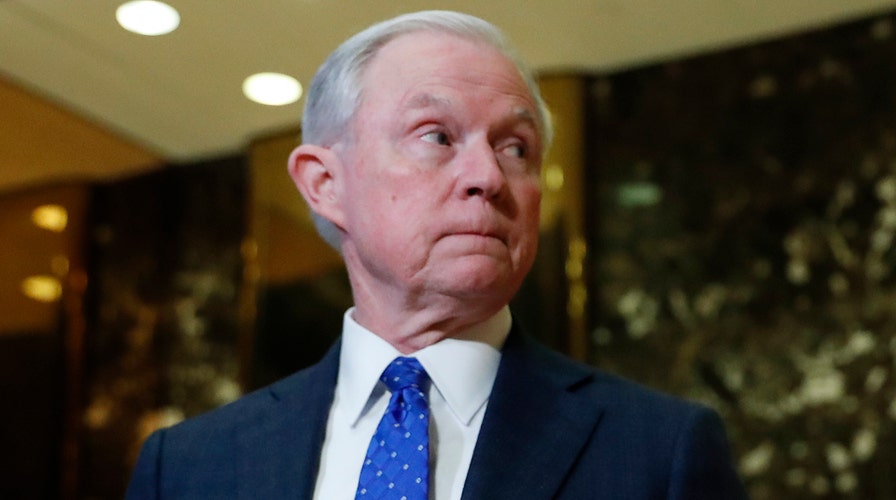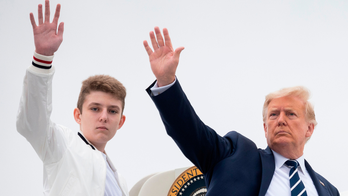President-elect Donald Trump on Friday announced his first two Cabinet picks: Alabama Sen. Jeff Sessions as attorney general and Kansas Rep. Mike Pompeo as CIA director.
Trump also confirmed that he called on retired Lt. Gen. Michael Flynn to be his national security adviser.
Sessions, Pompeo and Flynn have all been outspoken critics of President Obama and how his administration has handled terrorism and national security.
In picking Sessions and Flynn, Trump is rewarding two loyalists who were among his most ardent supporters during the presidential campaign.
Trump praised all three men in a lengthy written statement, calling Sessions “a world-class legal mind” who is “greatly admired by legal scholars and virtually everyone who knows him.”
Sessions, who accepted Trump’s offer and awaits confirmation hearings by the Senate, said he looks forward to fulfilling his duties “with an unwavering dedication to fairness and impartiality.”
Trump said Pompeo “will be a brilliant and unrelenting leader for our intelligence community to ensure the safety of Americans and our allies.”
He said Flynn, a retired Army lieutenant general and former director of the Defense Intelligence Agency, “will be by my side as we work to defeat radical Islamic terrorism, navigate geopolitical challenges and keep Americans safe at home and abroad.”
Trump is a foreign policy novice, and his early moves on national security are being closely watched both domestically and globally.
Like Sessions, Pompeo will need to be confirmed by the Senate before assuming the role. Flynn does not require confirmation.
Even though Republicans control the Senate, Sessions could face obstacles with his confirmation.
He withdrew from consideration for a federal judgeship in 1986 after being accused of making racist comments while serving as a U.S. attorney in Alabama.
Sessions, the first senator to endorse Trump, has been a leading proponent of tough immigration enforcement policies. He's tangled with the past two Democratic-appointed attorneys general on whether terrorism suspects deserve the protections of American civilian courts and on the planned closure of the Guantanamo Bay detention facility. He's also been protective of the attorney general's right to refuse a legally unsound directive from the president.
Pompeo is a conservative Republican and a strong critic of Obama's nuclear deal with Iran. A three-term congressman, he graduated from the United States Military Academy at West Point and from Harvard Law School.
Pompeo has said that Muslim leaders are "potentially complicit" in terrorist attacks if they do not denounce those made in the name of Islam.
"They must cite the Koran as evidence that the murder of innocents is not permitted," he said in a 2013 House floor speech.
Flynn was a critic of Obama's military and foreign policy long before he began advising Trump on national security issues during the presidential campaign. As national security adviser, Flynn would work in the West Wing and have frequent access to Trump.
The 57-year-old has been outspoken in his warnings about the dangers of Islamist groups, saying the U.S. needs to "discredit" radical Islam. He's called Islam a "political ideology" and said it "definitely hides behind being a religion."
Flynn has also worried some national security experts with his warmth toward Russia. Like Trump, he's called for the U.S. to work more closely with Moscow.
Last year, Flynn traveled to Moscow to join Russian President Vladimir Putin at a celebration for RT, a television channel funded by the Russian government. Flynn said he had been paid for taking part in the event, but brushed aside concerns that he was aiding a Russian propaganda effort.
Trump has made no public appearances this week, but his meetings have signaled a focus on national security. He met Thursday with Japanese Prime Minister Shinzo Abe, his first face-to-face meeting with a foreign leader since winning the election Nov. 8.
He also consulted with former Secretary of State Henry Kissinger and sat down with South Carolina Gov. Nikki Haley, a potential contender to lead the State Department.
In a separate gesture of reconciliation with establishment Republicans, Trump plans to meet on Saturday with 2012 Republican presidential nominee Mitt Romney, who lambasted Trump as a "con man" and a "fraud" in a stinging speech in March. Trump responded by repeatedly referring to Romney as a "loser."
The two began mending fences after Trump's victory when Romney called to offer congratulations. They are to meet this weekend, a transition official says. Campaign manager Kellyanne Conway said they are still "working on" the meeting.
Since his stunning victory over Hillary Clinton, Trump has spoken with Putin, British Prime Minister Theresa May and nearly three dozen other world leaders by telephone.
Ron Dermer, Israel's ambassador to the United States, also visited Trump Tower and called the billionaire businessman "a true friend of Israel." He specifically cited as another "friend" Trump campaign CEO Steve Bannon, whose selection as a top White House adviser has created a backlash among Democrats. Breitbart, the news website Bannon ran before joining the Trump campaign, has been accused by Democrats of peddling conspiracy theories, white nationalism and anti-Semitism.
Trump, a reality television star, business mogul and political newcomer, also rolled out new teams that will interact with the State Department, Pentagon, Justice Department and other national security agencies as part of the government transition before his Jan. 20 inauguration.
The Associated Press contributed to this report.





